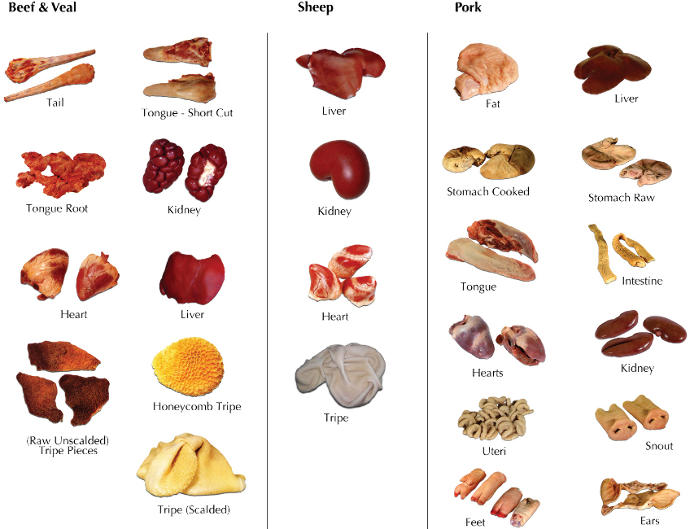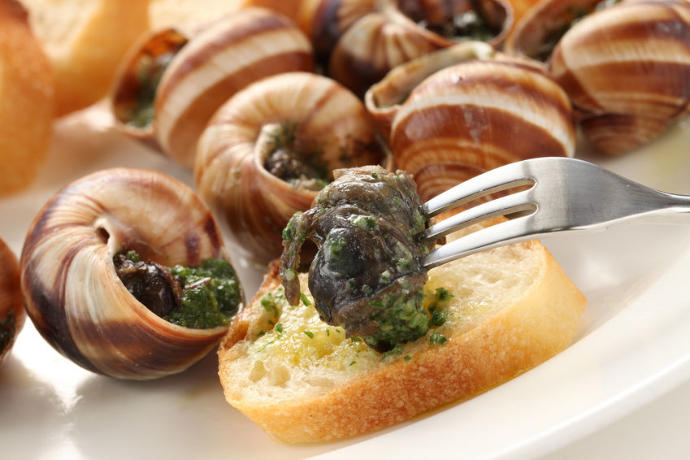What does meat connote to you? To many people in the West, they think of beef, pork, poultry, or seafood. To many people in Asia, Africa, and South/Central America, bugs are an extra source of animal-based food that is rich in animal protein. In France, escargot is a dish made from snails.

That said, the definition of meat itself shapes how we view vegetarianism and veganism. For strict, traditional Catholic Westerners during the Lenten fast and on Fridays, they are not supposed to eat meat. However, Catholics are allowed to eat fish and waterborne creatures, because they are not considered "meat". Non-Catholic Vegetarian Westerners do not eat meat in the form of poultry, pork or beef, but they do eat animal products in the form of milk and eggs. Non-Catholic Vegan Westerners eliminate the aforesaid animal products from their diet, because they believe all animal products in the farms are products of "animal" cruelty and unsustainable farming practices.

The word "vegetable" is a culinary term, not a scientific term. Similarly, the word "meat" is a culinary term, not a scientific term. If we limit the definition of meat to only poultry, pork, and beef, then it is pretty obvious that the arguments for veganism win by a landslide. However, if we expand the definition of meat to any dish made from any animal and animal-like single-celled microorganism, then that may turn the table and make the vegan-meat debate less clear-cut.
Fish and Waterborne Creatures
Source: Why Do Christians Eat Fish on Friday and During Lent?
In the first century, Jews fasted on Mondays and Thursdays. The original Christians were all Jewish and were used to the fasting as a spiritual discipline. They moved the fast days to Wednesdays and Fridays, because Judas engineered Jesus' arrest on a Wednesday and Jesus was crucified on a Friday. Most often that fast took the form of avoiding meat in the diet. In those days, meat was a luxury food. You either had to buy it in a market or you had to own enough land to keep cattle. On the other hand, anyone could grow vegetables or forage for them, and anyone could catch a fish in a lake or a stream. You could buy better fish and vegetables, but the point is that you could eat without money if you were poor. So meat was rich people's food and fish was poor people's food. That is why the most common form of fasting was to omit meat and eat fish.
As a result, fish is not considered meat by very traditional, old-school, strict Catholics. Obviously for non-Catholics, fish and "seafood" are meat. In the 21st century, overfishing is a major problem, and thus fish is not a sustainable, reliable source of food anymore. Moreover, fish is actually considered one of the pricier types of meat, a type of luxury food for the affluent.

Milk, Milk-Based Derivative Products, and Eggs
Lacto-ovo vegetarianism has a similar ethical foundation as veganism, but the lacto-ovo part allows the consumption of milk and eggs out of a belief that milk and eggs do not harm the animal. Therefore, milk and eggs are not considered "meat".

Anyhow, vegans are typically repulsed by that kind of consumption, often using images and metaphors to incite disgust. To vegans, eggs are "bird periods", and milk-based dairy products are "pus". I remember a guy from a documentary (I think it was Cowspiracy?) who humorously calls milk "baby cow growth fluid". Moreover, they may argue that it is unnatural (thus morally wrong) to consume the milk of another animal or the menstrual product of another animal. That said, vegans justify that breast milk is morally fine, because human breast milk comes from humans. Though, I am not sure how they will feel about the fact that some women of reproductive age would literally sell their breast milk to grown men or use breast milk as a sexual fetish. I suppose they may use the "natural" argument again.
Using the "natural" argument for moral debates is pretty commonplace. In the homosexuality debate, anti-gay advocates propose that homosexuality is "unnatural" and justify the "unnatural" behavior by the authority of the Bible. Pro-gay advocates propose that homosexuality is "natural" and justify the "natural" behavior by the authority of Mother Nature. If homosexuality exists in other species, and it does, then homosexuality must be natural in humans. Therefore, they believe that homosexuality is natural.
Mother Nature does not always mean morality, and to base morality on nature alone would be counter-intuitive. Many people are taught good manners at a young age. Good manners are cultural/learned behaviors that build a harmonious society. Without culture, people are left with just natural and selfish impulses, making it impossible to form a harmonious society. A balance between culture and nature is critical in being humane. The problem is, cultural norms can conflict. While some Catholics may believe that eating fish is acceptable during Lent or on Fridays, vegetarians and vegans (who are not Catholics) disagree, because they view fish as "meat".

Offal
Throughout history and in various cultures, muscle meat is a type of luxury food. Offal may be viewed as meat or not real meat at all. Indeed, one thing that people do before consuming food is discard the "junky stuff", which usually refers to the "inedible parts" of the animal. Hair, nails, eyeballs, hearts, heads, tails, stomach, lungs, etc. are all offal. America is known to be a prosperous, developed country, so Americans may view these products as "not really meat". When these products are cooked as food, Americans tend to view the dishes with disgust, because they knowingly have to consume this "non-meat" thing on the table.

Regardless of how disgusting Americans may find offal to be, consuming offal is actually more resourceful and economical than and just as nutritious as consuming just the muscle meat of the animal. Although consuming offal is exhibited by people mainly from developing countries and sometimes developed countries who retain traditional dishes using offal, it is extremely atypical for an American to consume offal, unless he is this guy.
Bugs or Creepy-Crawlies
Insects, arachnids, crustaceans, and mollusks are collectively known as bugs or creepy-crawlies. While Americans do not view these things as real meat, these things may be considered a good source of animal protein in developing countries and developed countries that retain traditional dishes. Because bugs are not viewed as meat, some vegetarians accept bugs as an acceptable form of food. The rationale is that bugs are not sentient creatures or that they cannot feel pain and therefore can be eaten.

Fungi
Fungus is a big kingdom. Mushrooms, yeast, and molds are all part of the fungus kingdom. Fungus deserves its own category, because fungi are uniquely different from animals and plants. Like animals, they are chemoheterotrophic. Their biological structure is more similar to animals than plants, and it is a major reason why fungus infections in humans is more difficult to treat than bacterial or viral infections.

In cooking, various species of non-toxic fungus may be used. Despite the animal-like properties of fungus, people view fungus as "vegetables", not "meat". Yeah, people are strange like that. So, you see vegans who are allowed to eat mushrooms and Saccharomyces cerevisiae (baker's yeast and nutritional yeast).
Why do Americans make such a restrictive definition of meat?
My speculation is that Americans are wealthy enough to reject the crappy stuff from the animal and only get the valued muscle meat. If no one wants the crappy parts of the animal, then the crappy parts of the animal will not sell well on the market. So, the crappy parts of the animal have to be used for other industrial processes to minimize wastage, such as making hot dogs and other processed meats. As generations of Americans come and go, a culture arises, thinking that the only kind of meat available is muscle meat that comes from cattle, swine, and birds. No one gets crappy gut meat; that's fed to the dogs and cats and "lower animals".

Religion may also play a role in food choice. Many Americans are Protestants, not Catholics. Unlike the Catholics, Protestants do not have any dietary restrictions. So, strict, traditional Catholics see fish as non-meat and safe to eat during Lent and on Fridays, while Protestants see fish as meat.

Vegetarianism in America used to be strongly associated with the Seventh Day Adventists, because other Christians ate meat (poultry, pork, beef, fish). The SDAs would produce tofu in America as a meat substitute, creating the association of tofu and vegetarianism in the West. Even today, Seventh Day Adventists put a lot of emphasis on health and faith, and many of them are vegetarians or vegans.

As time passes by, the arguments for and against veganism and vegetarianism become overwhelmingly secular. Unlike the Catholics, modern-day vegetarians and vegans view fish as meat and thus should not be consumed. Unlike the Seventh-Day Adventists, modern-day vegetarians and vegans do not advocate Kosher laws or the concept of "clean" foods. Vegans, religious or nonreligious, base their diet on two secular reasons. First, they are against the cruelty that occurs in factory farms. Second, they are against the destruction that the animal agriculture industry has on the environment.
Why I Identify As An Omnivore
Throughout different points in history and different places around the world, people have different and conflicting ideas about what is considered meat. Meat is generally described as "animal products", but various cultures have their own classifications and rules about what "animal products" really mean and look like.

I graduated from college with a background in the biological sciences. With extensive knowledge about the scientific taxonomy, I sometimes wonder what people really mean when they say "meat". I remember going to the cafeteria one day in the hospital, and the menu said "vegetarian", but the dish had fish in it. Sometimes, the vegan/vegetarian-labelled dish had mushrooms. Mushrooms are fungi, not plants. Fungi are more similar to animals than plants, so they should be classified as "meat products". Some fungi taste like meat too, like Shitake mushrooms. I love eating Shitake mushrooms, because they have a rich, meaty taste. If fungi are classified as "meats" instead of "vegetables", then many vegans would really be meat-eaters, because they tend to put Saccharomyces cerevisiae (nutritional yeast) in food to obtain vitamin B12.

I believe that if the definition of meat is changed from "muscle meat from cattle, pig, bird, and fish" to "any kind of food product that comes from an animal or animal-like microorganism, which may include species from bacteria and fungi", then the debate seems to be in favor of the omnivore eating pattern, as opposed to the vegan eating pattern. Under the new definition, vegans cannot consume nutritional yeast to get their vitamin B12, and as a result, they will be horribly nutritionally deficient. And they cannot consume the bacteria that synthesize vitamin B12, because some bacteria move about like animals and consume organic matter like animals instead of synthesizing their own food (plant-like behavior). Therefore, the vegan position falls apart, and the omnivore position wins.

I propose a new argument. I believe that the meat/vegan dichotomy is a false one. There is no meat/vegan food. There is just food. Some food is more sustainable than others, because of our current conditions. So, I am against the consumption of meat in the form of factory-farmed/industrialized poultry, pork, beef, fish, eggs, milk, and milk-based derivatives; but I am for the consumption of non-toxic bugs (and other small, fast-reproducing animals), fungi, plants, and microorganisms. I believe that we should all be omnivores and identify ourselves as omnivores. Forget about "vegan" food products; those are probably a marketing ploy. Just eat food with as little artificial ingredients as possible in the most sustainable way, and you'll be happier and healthier. If that means eating disgusting food, then so be it. Beggars cannot be choosers.
What Girls & Guys Said
Opinion
1Opinion
I'm a ovo-lacto-vegetarian, from my point of view, fish are meat, because they are animals, that's why I don't eat them. But, when it comes to other animal products, like milk, eggs and honey - that's not meat, you don't have to kill an animal in order to get those products.
Vegans make their point by saying that dairy cows and hens are abused in the factory farms, and thus milk, milk-based derivatives, and eggs should not be consumed. However, family-owned hens and dairy cows seem to tear apart that argument. But then, the vegans use the gross factor: that milk and eggs are disgusting and unnatural, hence wrong.
Vegans are extremist, not all the cows, hens and bees are abused. You can compare them with any religious group of people, for example, there are peaceful muslims, like the Sufi, and there are Wahhabi extremists who support the Jihad (so called "holy war").